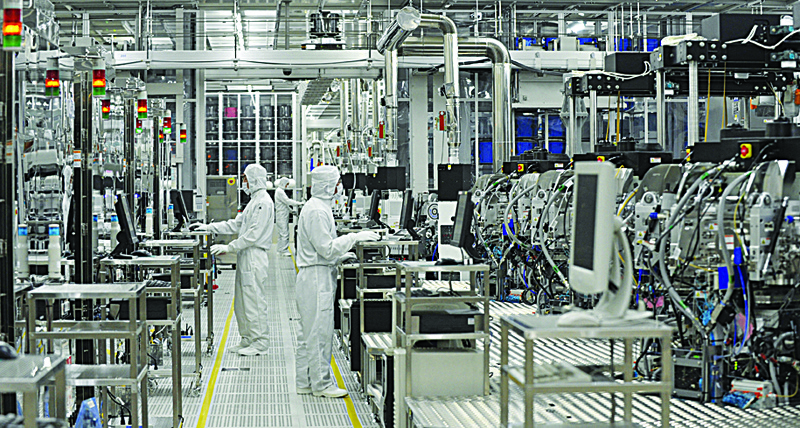 In this file photo, employees of Japan's microprocessor maker Renesas Electronics work at the company's Naka wafer fabrication factory in Hitachinaka, Ibaraki prefecture. - AFP
In this file photo, employees of Japan's microprocessor maker Renesas Electronics work at the company's Naka wafer fabrication factory in Hitachinaka, Ibaraki prefecture. - AFPTOKYO: Japan's government and automakers are lining up to offer support to a key chip manufacturer following a factory fire that could worsen a global semiconductor shortage plaguing car firms. The blaze at one of Renesas's plants last week comes at the worst possible time for the auto sector, which is already battling supply problems in part because of increased demand for chips from manufacturers of laptops, tablets and gaming devices.
"Amid global concerns over a semiconductor shortage, there could be a substantial impact," wrote UBS Securities Japan analysts Kenji Yasui and Sean Park in a note after the fire. Renesas controls about 35 percent of the market for automotive semiconductors and company president Hidetoshi Shibata warned this weekend of a "very big" impact on global chip supply.
Now Japan's government and some of Renesas's own customers, including top-selling Toyota, are offering help, in a sign of the deep concern caused by the fire given the existing supply problems. "It is important to support the company's efforts to recover from the fire as it could have economic and social impacts in Japan," said Kazumi Nishikawa, an official in charge of the tech sector at Japan's ministry of economy, trade and industry.
Government support is not likely to include financial assistance, but could involve coordinating help from the private sector or helping Renesas procure replacement equipment. "What is important right now is to prepare an environment in which Japanese industry as a whole will cooperate for a quick recovery," he said yesterday.
Toyota confirmed it had sent several staff to "investigate the situation" at the plant in northeastern Ibaraki prefecture, but gave no further details. The March 19 fire burned through 600 square metres of a unit producing 300mm wafers, and Renesas says it hopes to restore operations within a month. But Satoru Takada, an auto analyst at Tokyo-based research and consulting firm TIW, said production was unlikely to be back to normal quickly.
"Renesas said it would recover in a month, but it may not be able to get back to full capacity straight away. The impact could drag on," he said. Some reports have said it could take closer to three months to restore capacity, and Takada said automakers need to "consider ways to reduce supply shortage risks that affect their entire production".
'Manageable and one-off'
Automakers in Japan and abroad have been circumspect about the impact. Firms including France's Renault, Germany's Volkswagen and Hyundai in South Korea told AFP they would take action as necessary to deal with any additional shortages, but declined to give details. In Japan, Honda, Nissan and Toyota all said they were still studying the impact of the fire.
Analysts said further chip shortages were unavoidable, especially given earlier hits including a halt in production in Texas during recent cold weather. Experts at Moody's Investors Service were already warning earlier this year of a "bottleneck" lasting "for the next two to three quarters until semiconductor supply and stock levels have normalized".
"The incident adds to the existing supply chain disruptions that the auto industry has been experiencing in recent months," wrote Mariko Semetko, VP-senior credit officer at Moody's Japan, in a note after the Renesas fire. But there are hopes that the long-term impact could be limited by efforts that were already underway by automakers to diversify their suppliers, and by manufacturers to boost semiconductor production.
"Although the fire really could not have come at a worse time, its impact should prove manageable and one-off," said Amir Anvarzadeh, a strategist at Asymmetric Advisors. Longer term, Renesas is well placed to get back on its feet quickly, he added. "When you have your own customers sending help to repair the facility damage and bring production back on line ASAP, you know you have a good business." - AFP









